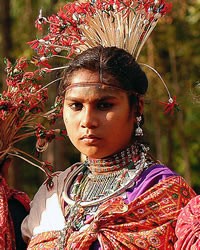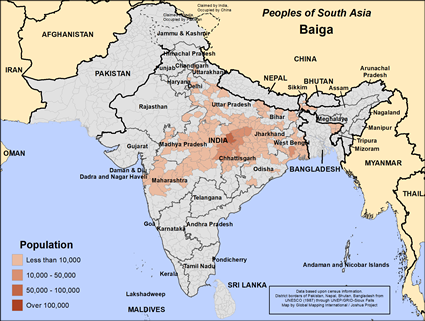Baiga is a subgroup of the Romani. Baiga means "sorcerer-medicine man." Many Baiga believe they are descendants of the Rajputs of medieval India who were expelled from their homeland by Muslim invaders. They became grain-carriers and weapon-makers for Muslim troops. Others wandered throughout India and beyond, as a destitute, ignored, and misunderstood people. Their only valuables were the tools they used in professions, such as masonry and blacksmithing.
No matter where they live throughout the world, Romani subgroups are linked linguistically. All Romani languages belong to the North Indo-Aryan language family. When the Romani began traveling from India to different regions of Europe hundreds of years ago, they developed different dialects.
The largest group of Romani remaining in India is the Lambadi (or Gormati). Other groups include the Tamil nomads, the Indian Romani, the Kanjari, and the Baiga. India's Baiga live in Chhattisgarh and Madhya Pradesh, with a small number living in neighboring Bangladesh.
The Baigas often practice live-in relationships rather than formal marriages. A man who marries a woman must pay her family for losing her labor.
The Baiga are noted for their relationship with the forest and their ability to gather forest produce, wood and other goods to sell. Some specialize in making broomsticks, iron tools and needles. Others have developed the art of tattooing. Baiga women are known for their tattoos. Baiga women love tattoos; early in life, they tattoo their foreheads, and as the years pass, they sometimes tattoo their entire bodies. Tattoos are for cosmetic purposes. Baiga women also love the idea of a tattoo's permanence.
A Baiga will only settle down when he cannot adapt to the needs of the region. Those who farm are reluctant to continue harvesting from the same land year after year. They believe this would scratch the breast of mother earth and eventually weaken her. Baiga people believe babies must be born "into the lap of mother earth." For this reason, a woman will have her baby while lying on a rug on the ground.
Most Baiga are Hindu, but they have combined Hindu practices with their own beliefs. Baigas follow folk beliefs and mix them with taboos. One taboo among the Hindu Baiga is that a woman's hair must not be combed or let down long in the presence of men. Another is that a woman should not pass in front of a man who is sitting but behind him.
Many live in poverty. Usually, the only clothes a Baiga owns are the ones on his or her back. An unsanitary lifestyle has created many physical needs among them. The quality of health care, nutrition and education is poor. Most children do not attend school. They need adequate educational opportunities to raise their standard of living. For this reason, the state of Chhattisgarh considers the Baiga a vulnerable tribe, partly because of their low literacy rate.
Pray for the Baiga culture to be renewed and enhanced by a work of the Holy Spirit and shaped into a God-centered and God-honoring mold.
Pray for the Holy Spirit to move among Baiga family and community leaders in India to seek his face and enjoy his blessings.
Pray for the Lord to thrust out workers who will be compelled to nurture a movement to Christ among the Baiga people in India.
Pray that their dire conditions will soon lead the Baiga to seek the One True God who yearns to give them the peace and joy of the Lord.
Scripture Prayers for the Baiga in India.
| Profile Source: Joshua Project |












